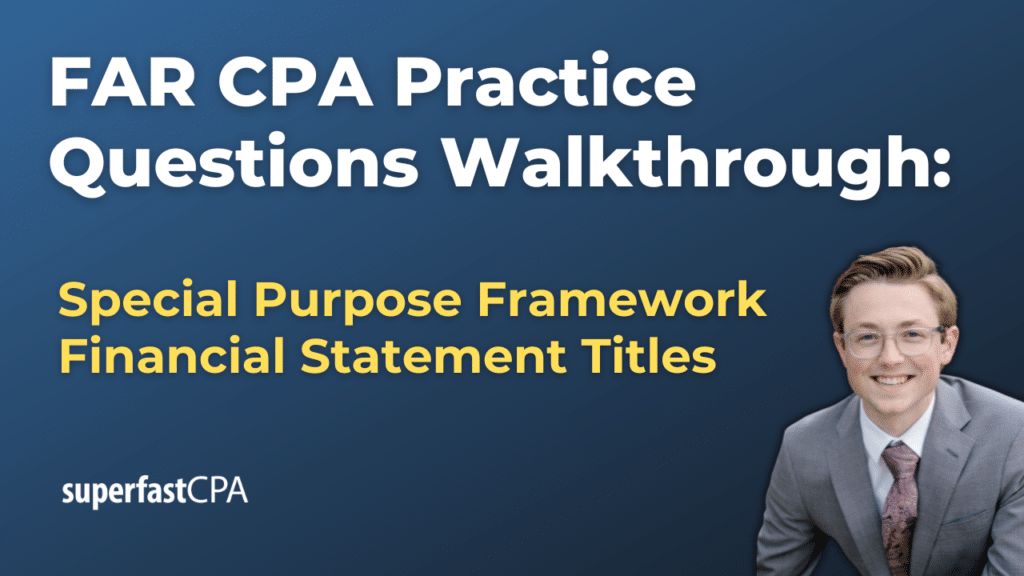In this video, we walk through 5 FAR practice questions teaching about special purpose frameworks financial statement titles. These questions are from FAR content area 1 on the AICPA CPA exam blueprints: Financial Reporting.
The best way to use this video is to pause each time we get to a new question in the video, and then make your own attempt at the question before watching us go through it.
Also be sure to watch one of our free webinars on the 6 “key ingredients” to an extremely effective & efficient CPA study process here…
Special Purpose Frameworks Financial Statement Titles
In accounting, financial reporting typically follows Generally Accepted Accounting Principles (GAAP). However, certain entities use special purpose frameworks, also known as Other Comprehensive Bases of Accounting (OCBOA), which offer alternative methods for preparing financial statements. These frameworks are particularly useful for entities that are not required to follow GAAP, and they include the cash basis, modified cash basis, tax basis, and regulatory basis.
What is a Special Purpose Framework (OCBOA)?
A special purpose framework refers to a financial reporting method outside of GAAP. Common examples include:
- Cash Basis: Recognizes revenues and expenses when cash is received or paid.
- Modified Cash Basis: A hybrid of cash and accrual accounting, combining cash-based transactions with some accrual adjustments (e.g., for fixed assets or long-term liabilities).
- Tax Basis: Follows the Internal Revenue Code, reflecting how revenues and expenses are recognized for tax purposes.
- Regulatory Basis: Used to comply with specific regulatory requirements for reporting, such as in the financial or insurance industries.
These frameworks are tailored for specific reporting purposes, such as meeting tax regulations or contractual obligations. As a result, the financial statement titles used in OCBOA frameworks differ from those used in GAAP.
Financial Statement Titles for OCBOA
The titles of financial statements prepared under OCBOA frameworks must reflect the accounting basis used. For example, you won’t see a “Balance Sheet” or “Income Statement” under these frameworks, as those titles are specific to GAAP. Instead, you might see:
- Cash Basis:
- “Statement of Cash Receipts and Disbursements”
- “Statement of Assets and Liabilities (Cash Basis)”
- Modified Cash Basis:
- “Statement of Assets, Liabilities, and Equity (Modified Cash Basis)”
- “Statement of Revenues Collected and Expenses Paid (Modified Cash Basis)”
- Tax Basis:
- “Statement of Revenues and Expenses (Tax Basis)”
- “Statement of Assets, Liabilities, and Equity (Tax Basis)”
These titles provide a clear distinction between the accounting methods used and help users understand the framework governing the financial statements.
Tax Basis of Accounting
The tax basis of accounting prepares financial statements in accordance with the Internal Revenue Code. Revenues and expenses are recognized based on how they are reported for tax purposes, which may differ from GAAP’s accrual accounting method. For example, depreciation might be calculated differently for tax reporting, leading to financial statement titles like “Statement of Revenues and Expenses (Tax Basis)” or “Statement of Assets, Liabilities, and Equity (Tax Basis).” This framework is common for entities focused on aligning their financials with tax returns.
Key Takeaways
Here are the key concepts covered in this post:
- Special Purpose Frameworks (OCBOA): These frameworks include cash basis, modified cash basis, tax basis, and regulatory basis, and are used by entities not required to follow GAAP.
- OCBOA Financial Statement Titles: Titles like “Statement of Revenues and Expenses (Tax Basis)” or “Statement of Assets and Liabilities (Cash Basis)” reflect the specific accounting framework used, ensuring clarity for financial statement users.
- Examples of OCBOA Financial Statement Titles:
- Cash Basis: “Statement of Cash Receipts and Disbursements”
- Modified Cash Basis: “Statement of Assets, Liabilities, and Equity (Modified Cash Basis)”
- Tax Basis: “Statement of Revenues and Expenses (Tax Basis)”
By understanding these frameworks and the associated financial statement titles, you can better navigate the unique reporting needs of entities that don’t follow GAAP













